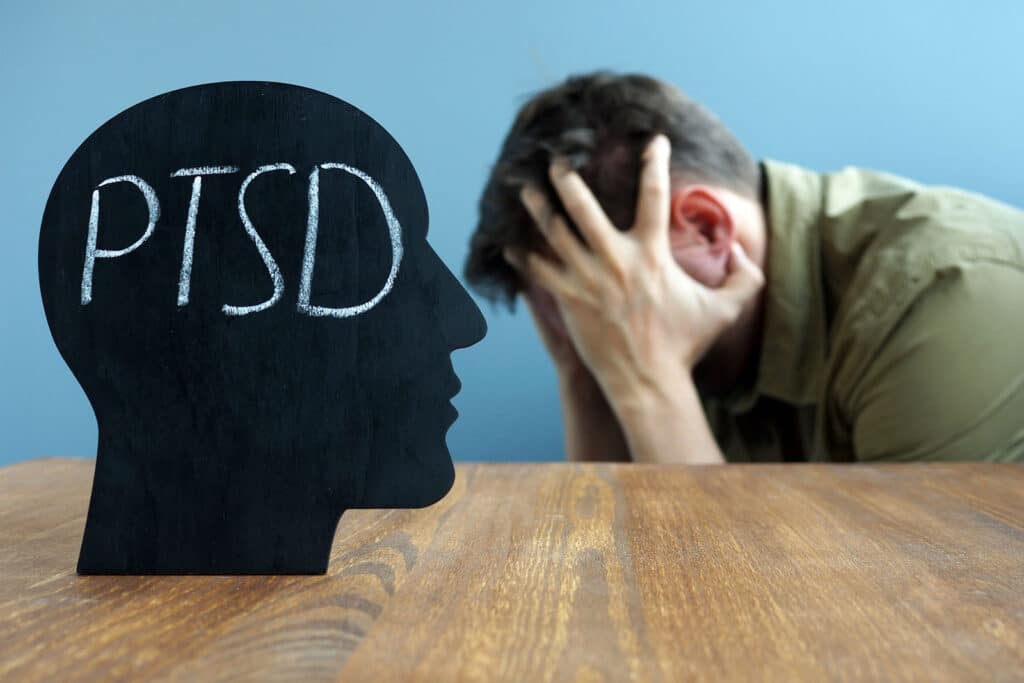Post-Traumatic Stress Disorder (PTSD) affects a person’s life in many ways. Often, they experienced flashbacks, anxiety, or nightmares related to the traumatic event.
Unfortunately, that can lead to a disruption in their emotional and psychological well-being.
This PTSD struggle can become a daily battle. Many times, it leads to complications with relationships, careers, and personal fulfillment.
When left untreated, PTSD can intensify over time. As a result, that can lead to other challenges, such as substance use disorders or worsening mental health. Seeking professional rehabilitation is vital to reclaiming control and building a life beyond trauma.
At the Garden State Treatment Center, we are here to help. Our programs provide evidence-based, compassionate care. We are available to guide individuals on their path toward recovery.

Table of Contents
- 1 Why Seek Rehab for PTSD?
- 2 PTSD and Substance Abuse Are Connected
- 3 Treatment Options at Garden State Treatment Center
- 4 What Sets Garden State Treatment Center Apart?
- 5 Compassionate and Experienced Professionals
- 6 Focus on Long-Term Recovery
- 7 Taking the First Step Toward Healing
- 8 Why Choose Garden State Treatment Center?
- 9 Start Your Path to Recovery
Why Seek Rehab for PTSD?
The symptoms of PTSD will not go away on their own. Many times, these issues will only worsen, leaving a person with no hope and falling deeper into despair.
Professional treatment is needed for meaningful and sustainable recovery. PTSD extends beyond mental health. This condition can affect:
- Physical health
- Personal relationships
- Social activities
Without help, individuals may feel trapped. They may be in a never-ending cycle of:
- Emotional distress
- Avoidance
- Unhealthy coping mechanisms, such as substance use
Recovery programs provide a supportive environment to confront trauma in a safe space. Clients can reprocess painful experiences while under the supervision of caring healthcare providers. During this time, they can develop healthy coping skills and build a foundation for long-term recovery.
PTSD and Substance Abuse Are Connected
The relationship between PTSD and substance use disorders is well-documented. There are some studies that indicate that up to 46% of individuals with PTSD struggle with substance abuse.
Emotional numbness, anxiety, and insomnia can be detrimental. In these cases, a person may use alcohol, prescription medications, or illicit drugs to self-medicate.
The substances may offer temporary relief. However, they will only exacerbate the underlying issues. That creates a dangerous cycle of dependency and worsening mental health. When this occurs, dual diagnosis treatment may be needed.
At the Garden State Treatment Center, our programs address both PTSD and substance use disorders. These options allow clients to understand their behaviors and find solutions to treat these issues.
Treatment Options at Garden State Treatment Center
We know that each person’s experience with PTSD is not the same. For this reason, we offer a range of evidence-based and holistic therapies, including individual therapy, group therapy, and family therapy, designed to address both the emotional and psychological impacts of trauma.
Psychotherapy options like Cognitive Behavioral Therapy (CBT) help clients identify negative thought patterns and replace them with healthier perspectives. Eye Movement Desensitization and Reprocessing (EMDR) uses guided eye movement to reprocess traumatic memories, reducing their emotional intensity and lessening the effects of intrusive flashbacks or distressing recollections. Dialectical Behavioral Therapy (DBT) works to improve emotional regulation and mindfulness, providing clients with the tools to overcome the emotions often associated with PTSD.
These programs provide a safe and controlled space for clients to address trauma, sometimes incorporating exposure therapy techniques to help individuals gradually confront their fears in a supportive environment.
Some clients are dealing with both PTSD and substance use disorders. In these situations, dual-diagnosis treatment is needed. These programs use trauma-focused therapies with addiction recovery techniques to address the root causes of both conditions. CBT, DBT, and EMDR can help clients work through the trauma and develop healthy coping mechanisms.
Sometimes, the road to recovery needs to focus on addressing more than physical symptoms. Treating the mind, body, and spirit is part of the process, often creating a sense of balance and inner peace for those struggling with trauma.
For example:
- Meditation and breathing exercises help individuals stay grounded and manage anxiety.
- Body movements and mental focus through yoga help with relaxation and reducing stress.
- Creative outlets like art and music therapy allow clients to express emotions that are hard to articulate.
When used with evidence-based treatments, individuals have more tools to help alleviate the causes and symptoms of PTSD. In turn, they can reclaim their lives.

What Sets Garden State Treatment Center Apart?
At Garden State Treatment Center, we take pride in our recovery programs. There are several factors that distinguish us as a trusted resource for healing and hope.
Personalized Treatment Plans
No two individuals experience trauma in the same way. For that reason, our team takes the time to develop customized treatment plans for every person. These plans look at each individual’s:
- Trauma history
- Co-occurring conditions
- Personal recovery goals
With that information, we can provide a tailored program for their needs. In turn, our clients can develop the tools needed for lasting recovery.
Compassionate and Experienced Professionals
We have a staff that includes licensed therapists, medical professionals, and addiction specialists. Each person is committed to delivering trauma-informed care. With this expertise, clients can count on receiving evidence-based treatments delivered with empathy.
We recognize that seeking help can be intimidating. Many times, individuals feel vulnerable or uncertain about recovery.
Our team creates a safe, welcoming environment at Garden State Treatment Center. No matter the situation, clients can feel supported throughout this process.
Focus on Long-Term Recovery
For some, short-term symptom relief is their main goal. However, long-term recovery is just as important. Aftercare services offer effective relapse prevention strategies. As a result, individuals can sustain their progress beyond treatment.
Taking the First Step Toward Healing
If you or a loved one is suffering with PTSD, the first step is the most difficult. Whether feeling shame, hopelessness, or fear, many don’t reach out for help. We are here to provide a glimpse of hope. Our team at our PTSD treatment center wants to make the process as easy as possible.
Getting help should not be another challenge you have to face by yourself. If you are a family member or friend of someone struggling with PTSD, your support can make a difference. Think of this as an act of love that could change the course of their life.
Why Choose Garden State Treatment Center?
Finding the right environment for a PTSD treatment program is important. Our treatment program focuses on the individual’s needs and experiences through individualized treatment.
Our licensed therapists and mental health professionals use compassionate techniques. We want to make sure that everyone feels safe throughout their recovery journey.
We have evidence-based therapies to help individuals process their trauma. With that, they can challenge negative thought patterns. These treatments develop better coping skills for clients. Our treatment approach addresses both the mind and body. Our holistic practices strengthen emotional resilience. These activities boost overall well-being. Often, our clients can find a sense of peace and balance.
Additionally, we recognize that many individuals struggling with PTSD may also face co-occurring disorders, such as substance abuse. Our specialized programs, including detox services and connections to addiction treatment centers, address all aspects of a person’s mental health. We offer various levels of care, including inpatient, outpatient, and residential treatment options to meet individual needs.
Finally, aftercare is an often-overlooked part of the process. Our community of fellow patients, alumni, and dedicated staff is here for you. Care doesn’t stop once you leave the facility. We provide a lifetime of support and encouragement.
Start Your Path to Recovery
Dealing with PTSD is a burden for many people. With this endless cycle, it may seem like there is no hope. Our residential program provides some light at the end of the tunnel. As a leading recovery center and residential treatment center, we are here to help you find peace and build a brighter future.
At Garden State Treatment Center, we have helped many clients regain control of their lives. It all starts with taking that first step. With our assistance, you can rediscover the strength to overcome the past.
Reach out to us and begin your journey to recovery.
Published on: 2024-12-31
Updated on: 2025-02-19



